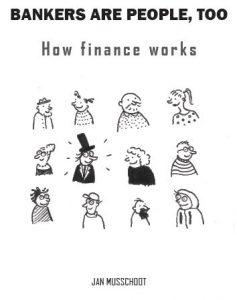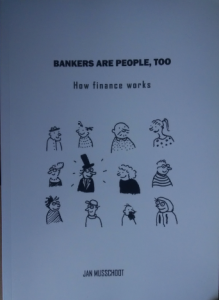Iedereen heeft wel eens vragen over geld, bijvoorbeeld over een beleggingsproduct, verzekeringen of je pensioen. Maar waar kan je best terecht voor meer informatie, onafhankelijk van een commerciële bank of verzekeraar? Continue reading “Geldvragen? Zoek op wikifin.be”
Europe and Japan: Monetary policies in the age of uncertainty (notes)
On 2 October, think tank Bruegel and Kobe University organized a conference on monetary policy in Brussels. The speakers compared the challenges faced by the European Central Bank (ECB) and the Bank of Japan (BoJ). This post is a reminder to myself based on my notes. I don’t cover the contributions of all participants. Don’t expect a story or a conclusion 🙂 Continue reading “Europe and Japan: Monetary policies in the age of uncertainty (notes)”
Two publication cultures: economics versus physics
In a recent blog post, professor Roger Farmer comments on the publishing process in economics. He writes that economic journal publishing is “a process that is highly centralised around five leading journals. These are the American Economic Review, the Quarterly Journal of Economics, the Review of Economic Studies, Econometrica and the Journal of Political Economy. For a young newly appointed lecturer, publishing a paper in one of these top five journals is a pre-requisite for promotion in a leading economic department […]” Continue reading “Two publication cultures: economics versus physics”
This blog is no longer found on Google. (Update: issue fixed)
The traffic to this blog has fallen steeply in recent days because my site no longer shows up in Google searches. If you’re looking for posts, use the search bar at the right hand side. The blog is still found by alternative search engines such as Bing and Yahoo. I hope to get the Google issue fixed asap.
Update, September 30: Continue reading “This blog is no longer found on Google. (Update: issue fixed)”
Bankers are people, too
My book is published!

Do you think banking is too hard for you? Are you convinced that all bankers are crooks? Would you like to follow the financial news, but you always get stuck on terms like derivatives, cryptocurrency or quantitative easing?
Then I have some good news. Continue reading “Bankers are people, too”
Book news!
Regular readers of this blog have probably noticed that I haven’t posted much lately. There is a good reason for that: I’ve been busy getting my book ready for print. I got the proof copy in the mail yesterday.
After working on this project for more than a year, it feels great to finally hold the result!

The book will be out next week, once the final corrections are done.
Bankers are people, too is an introduction to finance for the general public. In about 200 pages, I give a big picture overview of banking and money. The book explains how commercial banks create money, what central banks do, the distinction between banks and insurers, how quantitative easing works, the interaction between finance and the economy, and much more.
The topics in Bankers are people, too are not exactly bedtime reading material. That’s why the text is interspaced with cartoons. The ideas in the book are illustrated with plenty of examples and figures.
As soon as the book is out, I’ll have more to say on its content and why I picked this title.
Does having to sell my book mean that this blog is going to devolve into a series of ads for it? Well, no. I have a huge backlog of ideas for posts. Including one on blockchain/bitcoin, an assessment of QE, some reviews of books I’ve read, and how I (sort of) became an economist.
Should central banks have an Independent Evaluation Office?
Should the European Central Bank (ECB) have an independent evaluation office (IEO)? Benjamin Braun recently asked this question on Twitter.
What do #centralbanking people think re independent evaluation offices? @bankofengland has one. Should @ecb have one?https://t.co/vxVsioaZ1r
— Benjamin Braun (@BJMbraun) June 27, 2017
My first reaction was: probably not, because the ECB already evaluates its past performance. However, after more thought, I have changed my mind. This post examines some recent failures of central banks; how an IEO could improve monetary policy going forward1; and what it would take for the IEO to be an effective department rather than a paper tiger. Continue reading “Should central banks have an Independent Evaluation Office?”
Michael Lewis on the US Department of Energy (highly recommended!)
Michael Lewis, the author of The Big Short, has written a great article for Vanity Fair.
Why the scariest nuclear threat may be coming from inside the White House is a fascinating portrait of the Department of Energy.
If you’re interested in politics, management, innovation, nuclear weapons or environmental pollution, you should read the article now. Continue reading “Michael Lewis on the US Department of Energy (highly recommended!)”
Name change
I’ve renamed the blog. As a reminder, the previous name was ‘Money, Power, and Culture’.

Although that was an accurate description of the stuff I write about, it was also extremely boring. From now on, I’ll be Jansplaining banking and my observations of human behavior.
What do physicists do? Research, software, and finance
After I got my PhD in physics, I started working for a bank. People often ask why I left physics. I usually reassure them by saying that this career choice isn’t exceptional. In fact, most physicists don’t work “in physics”.
A report by the American Institute of Physics (AIP) tracked down physicists working in the private sector, who earned their PhDs in the U.S. about ten years earlier. The respondents were employed in a variety of industries, working as consultants, managers, (software) engineers, etc.
But what about the rest of the world? Are the AIP findings representative for all physicists? Continue reading “What do physicists do? Research, software, and finance”
